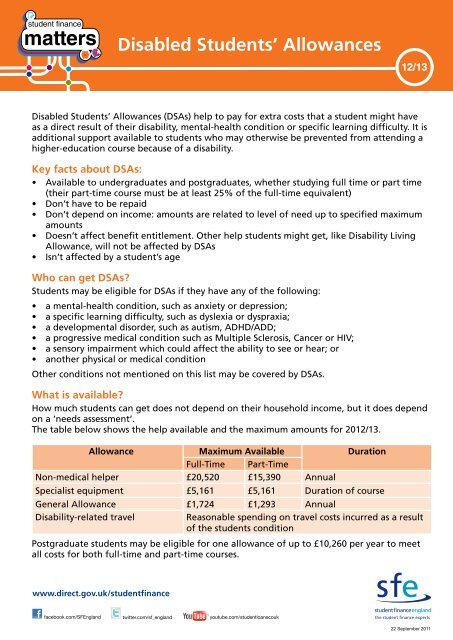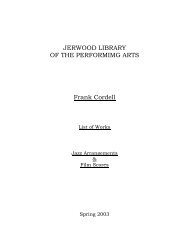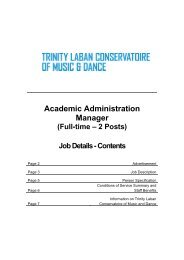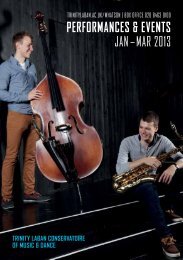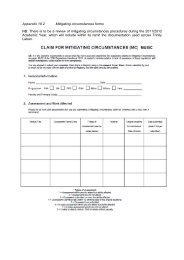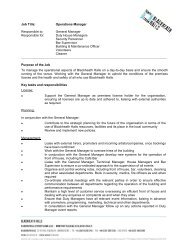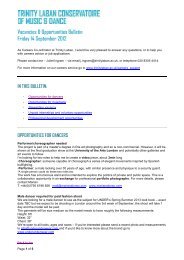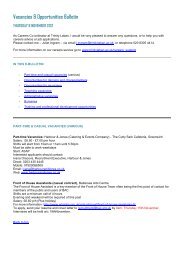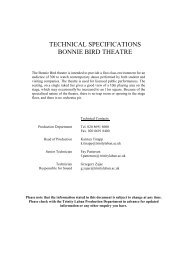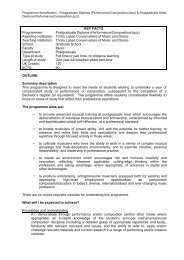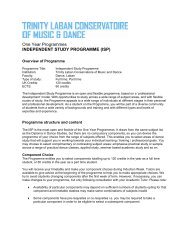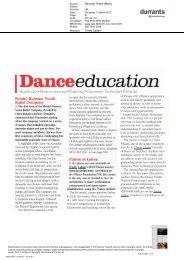Disabled Students' Allowances - Student Loans Company
Disabled Students' Allowances - Student Loans Company
Disabled Students' Allowances - Student Loans Company
You also want an ePaper? Increase the reach of your titles
YUMPU automatically turns print PDFs into web optimized ePapers that Google loves.
<strong>Disabled</strong> <strong>Student</strong>s’ <strong>Allowances</strong><br />
12/13<br />
<strong>Disabled</strong> <strong>Student</strong>s’ <strong>Allowances</strong> (DSAs) help to pay for extra costs that a student might have<br />
as a direct result of their disability, mental-health condition or specific learning difficulty. It is<br />
additional support available to students who may otherwise be prevented from attending a<br />
higher-education course because of a disability.<br />
Key facts about DSAs:<br />
• Available to undergraduates and postgraduates, whether studying full time or part time<br />
(their part-time course must be at least 25% of the full-time equivalent)<br />
• Don’t have to be repaid<br />
• Don’t depend on income: amounts are related to level of need up to specified maximum<br />
amounts<br />
• Doesn’t affect benefit entitlement. Other help students might get, like Disability Living<br />
Allowance, will not be affected by DSAs<br />
• Isn’t affected by a student’s age<br />
Who can get DSAs<br />
<strong>Student</strong>s may be eligible for DSAs if they have any of the following:<br />
• a mental-health condition, such as anxiety or depression;<br />
• a specific learning difficulty, such as dyslexia or dyspraxia;<br />
• a developmental disorder, such as autism, ADHD/ADD;<br />
• a progressive medical condition such as Multiple Sclerosis, Cancer or HIV;<br />
• a sensory impairment which could affect the ability to see or hear; or<br />
• another physical or medical condition<br />
Other conditions not mentioned on this list may be covered by DSAs.<br />
What is available<br />
How much students can get does not depend on their household income, but it does depend<br />
on a ‘needs assessment’.<br />
The table below shows the help available and the maximum amounts for 2012/13.<br />
Allowance Maximum Available Duration<br />
Full-Time Part-Time<br />
Non-medical helper £20,520 £15,390 Annual<br />
Specialist equipment £5,161 £5,161 Duration of course<br />
General Allowance £1,724 £1,293 Annual<br />
Disability-related travel<br />
Reasonable spending on travel costs incurred as a result<br />
of the students condition<br />
Postgraduate students may be eligible for one allowance of up to £10,260 per year to meet<br />
all costs for both full-time and part-time courses.<br />
www.direct.gov.uk/studentfinance<br />
facebook.com/SFEngland<br />
twitter.com/sf_england<br />
youtube.com/studentloanscouk<br />
the student finance experts<br />
22 September 2011
Section 5 - <strong>Disabled</strong> <strong>Student</strong>s’ <strong>Allowances</strong> (page 2 of 2)<br />
How do students apply for DSAs<br />
<strong>Student</strong>s should apply as soon as they can as the process can take up to 3 months.<br />
The ‘6 Steps to <strong>Disabled</strong> <strong>Student</strong>s’ <strong>Allowances</strong>’ explains the application process in detail.<br />
<strong>Student</strong>s will need to reapply every year for DSAs to continue receiving support such<br />
as general allowance, travel allowance, and potentially additional equipment and<br />
non-medical helper support:<br />
• If a student is applying for core student finance (loan, grant etc) all they need to do is<br />
indicate on the application for subsequent years by ticking the DSAs box that they wish to<br />
apply for DSAs - they don’t need to do anything else<br />
• DSA only applicants will need to complete DSA1 each year - but won’t need to resubmit<br />
their evidence<br />
What evidence is required<br />
For physical conditions<br />
For specific learning difficulties<br />
A report or letter from a student’s GP or Consultant<br />
A post 16 report from:<br />
• A chartered or practitioner psychologist<br />
or<br />
• A specialist teacher holding a current Assessment<br />
Practising Certificate<br />
For mental health difficulties A letter from the student’s GP<br />
The application form and guidance for DSAs can be downloaded from<br />
www.direct.gov.uk/studentfinance or by calling 0845 300 5090, by minicom 0845 6044434.<br />
Braille, audio and large print formats can be ordered by emailing<br />
brailleandlargefonts@slc.co.uk or telephoning 0141 243 3686. Please note:<br />
the above email address and telephone number can only deal with requests<br />
for alternative formats of forms and guides.<br />
Queries about DSAs can be directed to dsa_team@slc.co.uk or to Disability Officers at<br />
universities and colleges.<br />
www.direct.gov.uk/studentfinance<br />
facebook.com/SFEngland<br />
twitter.com/sf_england<br />
youtube.com/studentloanscouk<br />
the student finance experts<br />
22 September 2011


